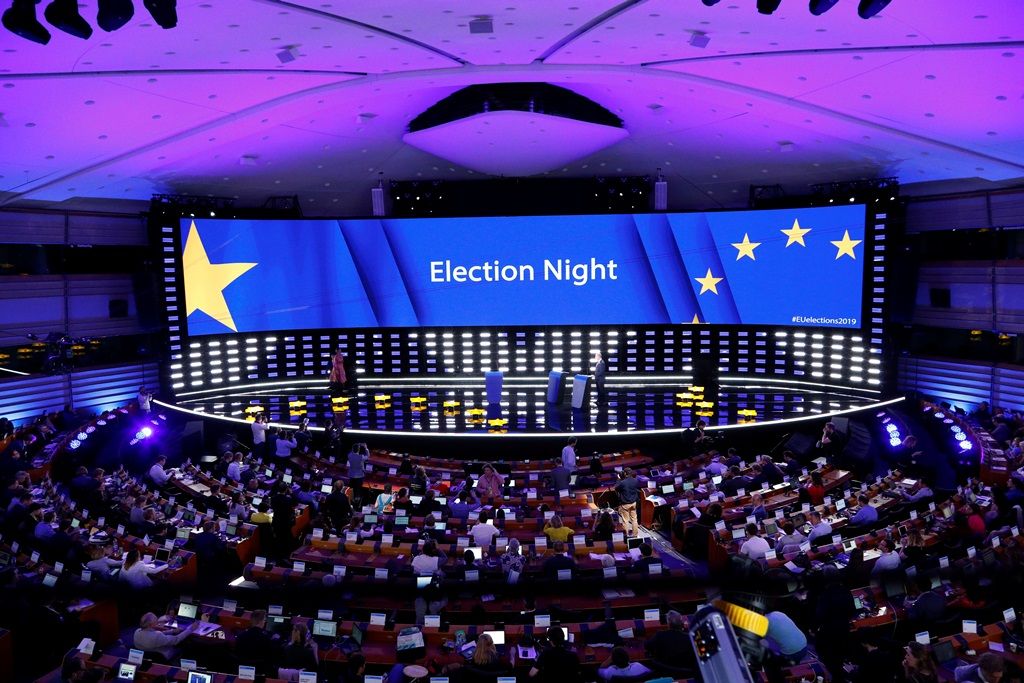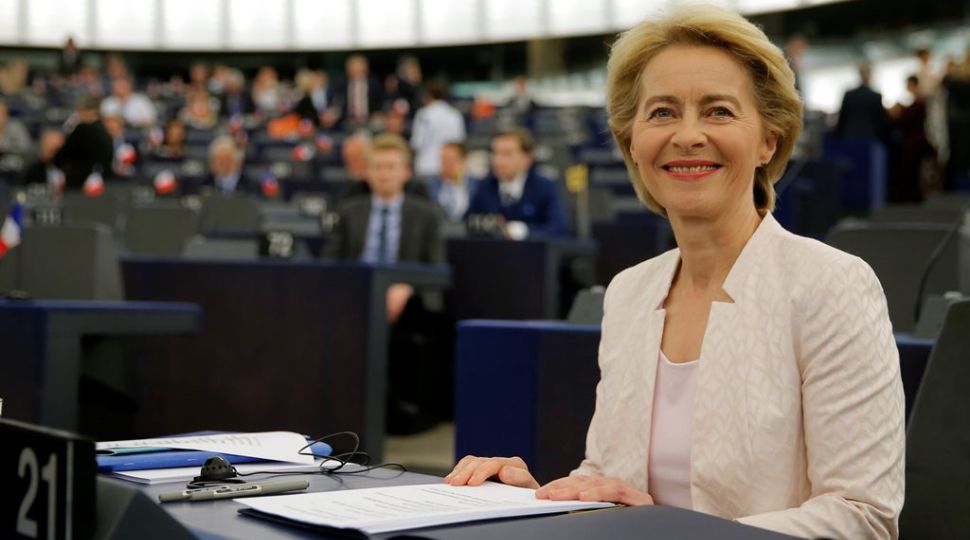No Revolution: European Parliament after the Elections

Parties united in the Christian Democratic European People’s Party (EPP) won the EP elections—despite losing around 40 seats—and will continue to be the largest faction in the chamber (see Fig. 1 below). The weakened Social Democrats (SD) remain the second force. The liberals (ALDE) and the Greens, supportive of further integration, gained mandates, but so did several Eurosceptic parties.
Centre Weakens, Still Dominant
For the first time in the history of the EP, the Christian and Social Democrats won less than 50% of seats. However, they will remain strong enough to retain decisive influence on EP decisions. To obtain the absolute majority necessary to elect the new European Commission (EC) president, they will probably negotiate with French President Emmanuel Macron and ALDE. Such a coalition materialised in 2014 when Jean-Claude Juncker’s candidature, and later the entire EC, was supported not only by the Christian and Social Democrats but by the liberals as well. The strengthened Greens could also become potential coalition partners, though they are a less attractive ally because, unlike the liberals, they do not have representatives on the European Council. Heads of state and government play a key role in filling the EU top jobs.
The balance of power in both political groups has changed. Among the Christian Democrats, the role of the parties from several large EU countries, Spain (12 seats), Italy (8), and France (8), which achieved poor results, will decrease. This will cement the German domination (29) and will also create favourable conditions for parties from Central Europe (Poles and Romanians will have 31 seats). In the Social Democratic group, as the Germans and the British lost seats, the influence of the parties from Southern Europe—Spain (20), Italy (18) and Portugal (9)—will grow.
Macron in Search of Allies
The French president’s party, La République en Marche (LRM), came second in France behind the National Rally led by Marine Le Pen. It was a small defeat numerically (less than a percentage point), but a highly symbolic one. Macron tried to present the elections as a confrontation between the supporters of integration, gathered around him, and Eurosceptic nationalists. Another disappointment for Macron was the failure of his attempt to build a new pan-European political formation. He wanted to attract parties that are currently members of the centre-left and centre-right factions, thus provoking a fundamental change in the balance of power on the EU political scene in his favour. Eventually, the LRM only concluded an agreement with the liberal faction. LRM MEPs (21 seats) will strengthen ALDE, but their presence may deepen internal differences. Several member parties from Northern Europe have different views on the future of the euro area than Macron. Despite the potential difficulties in relations with the liberals, this alliance gives the French president a chance to exert influence on key EU decisions, above all the post-election division of the most important positions. Macron will keep trying to attract other parties to ALDE, such as the Italian Democratic Party currently sitting in the SD group.
Eurosceptics Consolidate
The elections were a success for the Eurosceptic camp, but not as significant as it was supposed. Their informal leader is Deputy Prime Minister of Italy Matteo Salvini. MEPs from his party, the League, will be the strongest delegation (28 seats) in the political group in which they cooperate with, among others, the French National Rally (22). During the campaign, Salvini attempted to strengthen this alliance. He appealed not only to parties with a clearly Eurosceptic profile but also to more moderate EU critics. Salvini struck a deal with Alternative for Germany and parties from Denmark and Finland that sit in the conservative faction. He is also trying to attract Fidesz. Hungarian Prime Minister Viktor Orbán’s party was suspended by the EPP in March, and when he withdrew support for the Christian Democratic candidate for EC president, Manfred Weber, Fidesz’s relationship with the faction authorities became even more complicated. The Brexit Party (29) is the most attractive partner for Salvini. If he manages to convince them to cooperate, the political group built under his aegis will cross the 100-seat mark and may become the third force in the chamber. Yet, it will not give the Eurosceptics much greater clout. Their very limited coalition potential will prevent them from having an impact on parliamentary decisions, and the prointegrationist groups may also block them from accessing parliamentary positions.
Conclusions and Prospects
The new parliament will be similar to the current one, politically dominated by the centrist and pro-European alliance of Christian and Social Democrats, and the liberals. Currently, about 70% of the chamber’s decisions are made thanks to the support of this coalition. In the new EP, these three political groups will probably stick to this habit and try to build consensus as often as possible, thus creating a strong position for the EP in legislative negotiations with the EU Council. In this institution, the domination of the EPP, SD and ALDE is even more marked (parties belonging to these political families rule in 24 of the 28 Member States). Good cooperation between them will enable the Union to maintain the current course of incremental reforms.
Building joint decisions may, however, be more difficult for the tripartite coalition than in the previous term. If some Christian and Social Democratic parties, in reaction to the disappointing election results, decide to adopt positions that are more clear-cut ideologically, it will exacerbate the left-right cleavage. Rifts may become deeper due to the change in the balance of power within both factions. Under the influence of MEPs from the south of Europe, the SD will probably be more resolute in criticising austerity policy in the euro area. The EPP is likely to defend the German stance, stressing the need for reforms and reduction of public debt. Encouraged by the success of the Greens, the Social Democrats may promote the adoption of more ambitious targets in the fight against climate change, which will be difficult to accept for some centre-right parties.
If more divisions within the centrist coalition indeed occur, the EP may have difficulties in adopting positions for the negotiations of draft legal acts with the Council. Ad-hoc alliances of the centre-left (initiated by the Social Democrats and Greens) or centre-right (built around the Christian Democrats and conservatives) may be too weak to win votes. This will delay the decision-making process. It may also limit the ability of the EP to modify the Council’s proposals at the later stages of the legislative procedure and, consequently, undermine the position of the chamber in the institutional system. Like today, an important role will be played by the liberal group, whose support may determine the success or failure of a proposal.
The EPP and SD groups have resisted attempts to dent their membership. Although ideologically diverse, they constitute a useful instrument for national party delegations to influence decisions and access key positions. Nevertheless, both the Christian and Social Democrats have some internal problems. The issue of Fidesz’s membership in the EPP provokes disputes between the liberal and conservative wings of this group. The ruling Romanian Social Democratic Party, which, like Fidesz, is accused of breaching the rule of law, is an awkward partner for the centre-left. Further weakening of the main political groups, resulting from the possible withdrawal or exclusion of these parties, may bring about even greater unpredictability in the decision-making process.





